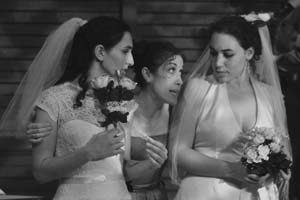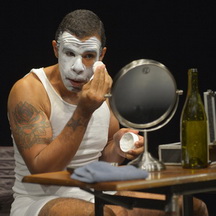Brides …

Based loosely on Aeschylus’ trilogy on the Danaides, the 50 daughters of Danaus who killed their bridegrooms on their wedding night, the play Big Love, by Charles Mee, examines gender and power-based gender relationships. Full of physicality—both male and female characters have prolonged scenes of throwing themselves on the floor and on each other—and moments of self-discovery around the meaning of love and traditional marriage, the play is a natural for young actors.
This past weekend the College of Marin opened its production of Big Love in the Studio Theater on the Kentfield-based campus. The college’s theater department has a lot of cred, having fostered Robin Williams, one of its graduates, and this production reveals the solidity of the program’s benefits and strengths.
Big Love begins with a bride running on stage and shedding her gown to climb into the bathtub just upstage of center. She relaxes with a sigh. A young man enters; seeing someone in the tub, he’s taken aback. What’s a stranger—and a naked woman, at that—doing in his bathtub?
The stranger is Lydia, one of the 50 daughters who have escaped their forced marriage to their uncle’s 50 sons. She is also one of the three daughters whose points of view become the web on which the play’s meditations on gender politics are woven. Her sisters—Thyona (the vivid Alicia Morales), a hard-edged and angry young woman who resents having her freedom to choose pushed aside and denigrated; and Olympia (lovely Elena Spittler), a childlike and girlish romantic who loves having her nails done and sees sexual role-playing as a fun game—are the two extremes of Mee’s feminine ideologies. Lydia, played by Ariel Allen, is the uncertain one, the one who falls in love with the cousin-groom she has been assigned. She becomes, ultimately, the romantic ideal that characterizes Mee’s sexual politics.
… and Grooms
Mee’s limited sense of feminist issues poses a problem for the female actors: their lines lack imagination about the questions presented, which in turn flattens their characters. Mee does much better for the men, even though he provides us with only two male reactions to the female characters’ feminism; Olympia’s male partner, Oed (Brady Boyd), is only sketchily portrayed in the script.
Nikos, Lydia’s partner, is the politically correct nice guy of the three bridegrooms. He wants Lydia to like him, to love him even, and will listen to and consider her desires, however nebulous they may be. He is earnestly self-aware, knows he’s a bit of a nervous bumbler; and his ability to admit that makes him vulnerable as well as accessible to her. The two fall in love. Nikos is played by David Abrams with subtle timing and subdued wit.
In Aeschylus’ play, Hypermnestra—Mee’s Lydia—decides not to murder her husband because he allows her to remain virgin on their wedding night. A more radical gesture than Mee’s, for, within it, virginity becomes a metaphor for individuality left unbreached and intact.
The most unusual of the characters is Constantine, played incisively and convincingly by Davern Wright. Constantine is the traditional male: marriage is a deal in which he gets to draw the conditions that he will enforce in whatever way he needs to. In the play’s most disturbing monologue, he explains that violence is the world of men, that a man gives a woman a gift by being violent toward her, because he allows her into a world that she deplores but that is nonetheless the “real world.” Twisted logic but an arresting explanation of the logic of interpersonal violence.
Bridging the two sets of brides and grooms is Giuliano, the young gay nephew of Piero, the man who grants the brides asylum. Emmanuel Linden-Broner delivers a complex interpretation of this ethereal character, who is observer and host to the women. His ably acted monologue on lost love is one of the few moments in which the mysteriousness of love—its ineffable tenderness—presents itself.
Where Mee’s modernization of Aeschylus’ trilogy is most successful is in the insertion of movement and song throughout the play. Scenes of yowling physical chaos brought a kind of white noise to events, lacing the story with a sense of the enigmatic and the grievous. Allen, Morales and Spittler sing and dance “You Don’t Own Me,” which I can’t help thinking might have been better without the recorded voice backup, no matter how modest the singers might be about their vocal talents. And Linden-Broner did a skillful rendition of “Bewitched, Bothered, and Bewildered,” haunting and magnetic within the cabaret setting of microphone and spotlight.
Supporting the young actors were Charles Isen as Piero and the bocce ball–wielding partygoer, Leo; and Floriana Alessandria as Piero’s mother, Bella, and Leo’s dolce vita partner, Eleanor. Alessandria was unfailingly exceptional as she metamorphosed between comic roles. Experienced actors with superb comic timing, Isen and Alessandria were chief among the benefits of this production and earmarks of the program’s excellent mentoring for young actors.
Molly Noble directed, and Kenneth Sonkin choreographed the movement.
—Jaime Robles
